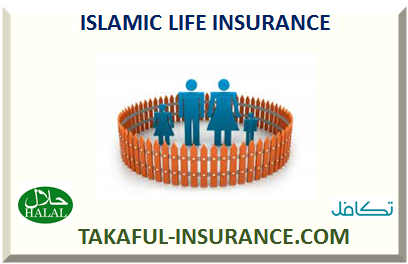
HALAL LIFE INSURANCE 2024
ISLAMIC LIFE INSURANCE TAKAFUL LIFE SHARIA COMPLIANT LIFE INSURANCE
A Halal life insurance in 2024 is by definition a financial instrument that is called Takaful life insurance and is designed to provide both financial protection and investment opportunities for individuals while adhering to Sharia-compliant principles.
The Halal life insurance has the primary objective to offer financial security to the Muslim and non-Muslim policyholder's beneficiaries in the event of the policyholder's death and this is achieved through the payment of a specified sum (sum assured) to the beneficiaries, ensuring that they are financially supported during challenging times.
The Islamic life insurance or Takaful life has significant role serving as a Sharia-compliant investment vehicle and Policyholders' contributions to the Takaful fund are invested in ethical and halal investment avenues, such as real estate, equities, and other permissible assets.
The Halal life insurance in 2024 plays a crucial role in providing financial protection to the policyholder's beneficiaries, ensuring their well-being in accordance with Sharia principles, simultaneously, it offers a halal investment opportunity, allowing participants to grow their wealth without compromising their faith.
What are the basic principles of Islamic life insurance?
Basic Principles of Islamic Life Insurance (Takaful)
Islamic life insurance, commonly known as Takaful, is grounded in Sharia-compliant principles that differentiate it from conventional insurance. The fundamental principles of Takaful serve as the cornerstone of its operation, ensuring adherence to ethical and Islamic financial standards. Below are the basic principles of Islamic life insurance:
1. Mutual Cooperation (Tabarru')
In Takaful, participants mutually contribute to a common fund, and these contributions are made voluntarily to help fellow participants in times of need. This principle fosters a sense of community and shared responsibility.
2. Shared Responsibility (Mudarabah)
Takaful embodies the concept of shared responsibility, where participants collectively bear the financial burdens of others. The common fund is used to provide assistance to those facing financial losses, such as death or disability.
3. No Interest (Riba)
Takaful strictly prohibits the payment or receipt of interest (Riba). This principle ensures that financial transactions within Takaful are free from any form of usury, conforming to Islamic finance ethics.
4. No Uncertainty (Gharar)
Takaful policies are designed to avoid uncertainty (Gharar) and ambiguity. The terms and conditions of the policy are transparent and free from elements of uncertainty, ensuring fairness in all transactions.
5. Ethical Investments
Takaful funds are invested in ethical and Sharia-compliant investments, such as real estate, equities, and Islamic bonds (Sukuk). This ensures that the returns generated from investments are halal and in line with Islamic principles.
What are the various types of Islamic life insurance available?
Types of Islamic Life Insurance (Takaful)
Islamic life insurance, also known as Takaful, offers a range of coverage options that cater to the diverse needs of individuals and families while adhering to Sharia-compliant principles. Below are some of the various types of Islamic life insurance available:
1. Term Takaful
Term Takaful provides coverage for a specified period, typically with a fixed premium. If the policyholder passes away during the term, the beneficiaries receive the sum assured. It offers pure protection without savings or investment components.
2. Whole Life Takaful
Whole Life Takaful provides lifelong coverage. It combines protection with savings and investment elements, allowing policyholders to build cash value over time. Beneficiaries receive the sum assured upon the policyholder's death.
3. Endowment Takaful
Endowment Takaful offers both protection and savings. If the policyholder passes away during the term, the beneficiaries receive the sum assured. If the policyholder survives the term, they receive the accumulated savings and returns.
4. Investment-Linked Takaful (ILT)
Investment-Linked Takaful combines life insurance with investment opportunities. Premiums are allocated to investment funds, and policyholders have the flexibility to choose from various fund options. The value of the policy depends on the performance of the chosen funds.
5. Critical Illness Takaful
Critical Illness Takaful provides a lump-sum payment if the policyholder is diagnosed with a critical illness covered by the policy. It offers financial support during challenging health situations.
6. Family Takaful
Family Takaful provides coverage for the entire family, including the primary policyholder, spouse, and children. It offers comprehensive protection for family members, ensuring their financial security.
How does Islamic life insurance differ from conventional life insurance in terms of conditions, criteria for eligibility, investments options, tariffs, documentation, ethical approach ?
Comparison: Islamic Life Insurance (Takaful) vs. Conventional Life Insurance
| Aspect | Islamic Life Insurance (Takaful) | Conventional Life Insurance |
|---|---|---|
| Conditions | Based on Sharia-compliant principles, no interest (Riba), and avoidance of uncertainty (Gharar). | May involve interest-based contracts and practices. |
| Eligibility Criteria | Open to individuals who seek Sharia-compliant options. | Open to a broader range of individuals, regardless of religious beliefs. |
| Investment Options | Ethical investments in halal assets, such as real estate, equities, and Islamic bonds (Sukuk). | Investments may include a wide range of assets, including interest-bearing instruments. |
| Tariffs | Participants' contributions are structured as premiums and are shared among participants based on losses and expenses. | Premiums are determined based on actuarial calculations and may include profit margins for the insurer. |
| Documentation | Contracts and policies are designed to comply with Sharia principles, avoiding interest and uncertainty clauses. | Documentation may include conventional insurance terms and conditions. |
| Ethical Approach | Adheres to Islamic ethical guidelines, promoting fair and ethical business practices. | May not always align with specific ethical or religious principles. |